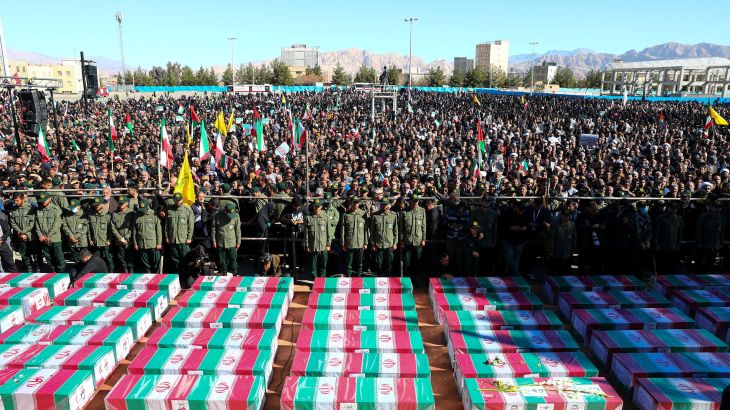Iran says ISIL members planning Eid al-Fitr ‘suicide attack’ arrested
ISIL claimed responsibility for twin bombings in Kerman this year that had killed nearly 100 people.

Iran says it has arrested members of the ISIL (ISIS) group who were planning an attack at the end of the Muslim holy month of Ramadan.
A concerned citizen called law enforcement in Mahdasht in the province of Alborz, about 60km (37 miles) west of the capital Tehran, which led to the arrest of “senior” ISIL member Mohammad “Ramesh” Zaker, police spokesman Saeed Montazerolmahdi said on Saturday.
Keep reading
list of 4 itemsIsrael boosts defences after Iran consulate attack in Syria
Who was Mohammad Reza Zahedi, an Iranian general killed by Israel in Syria?
Several killed in Israeli strike on Iranian consulate in Damascus
Zaker and two other ISIL members were taken into custody, he said, adding that eight people accompanying the “terrorists planning a suicide attack” next week during Eid al-Fitr, which marks the end of Ramadan, were arrested.
In January, twin bombings during a ceremony to commemorate the anniversary of the assassination of top commander Qassem Soleimani in the southeastern city of Kerman killed nearly 100 people and wounded more than 200.
The Islamic State in Khorasan Province (ISIS-K) – the Afghanistan-based branch of ISIL behind last month’s attack on a concert hall near Moscow that killed at least 144 people – claimed responsibility for the Kerman assault.
Iran arrested 35 people in connection with the attacks, including a commander of ISIS-K, in January.
The group was also behind attacks on a major Shia shrine in the southern Iranian city of Shiraz. Iran later publicly executed two assailants after a trial.
Deadly attacks in 2017 on Iran’s parliament and the tomb of Ayatollah Ruhollah Khomeini, the founder and first supreme leader of the Islamic Republic, were claimed by ISIL.
The group engages in sectarian violence, especially in Iran and other Shia-majority parts of the region.
The threat of another attack comes as Iran has been dealing with more security incidents as regional tensions rise because of Israel’s war on Gaza.
On Thursday, teams of armed men from the separatist Sunni group Jaish al-Adl attacked two bases of the Islamic Revolutionary Guard Corps (IRGC) in the southeastern border province of Sistan-Baluchestan.
The funerals of armed forces members killed by Jaish al-Adl were held in their hometowns, including in the western province of Lorestan and northern Mazandaran, on Saturday.
In Tehran, Isfahan and Lorestan, funeral processions were also held for seven members of the IRGC who were killed in an Israeli attack in Syria that destroyed the building of the Iranian consulate in Damascus.
Brigadier-General Mohammad Reza Zahedi, a senior IRGC commander killed in the Damascus attack, was buried on Saturday in his birthplace of Isfahan in central Iran.
Speaking to a crowd in Tehran on Saturday, the chief of staff of the Iranian armed forces, Mohammad Bagheri, said “the criminal US and the cruel and child-killing Zionists must know that the life of the regime [Israel] is coming to an end, and there is not much left until its decay and destruction”.
“Air strikes on a consulate, as a protected mission under international accords, have no meaning but madness from the Zionist regime because it is harming and killing itself. If politicians in Israel had any credibility left, this move destroyed it,” he said, renewing Iran’s vow for revenge for its killed commanders.